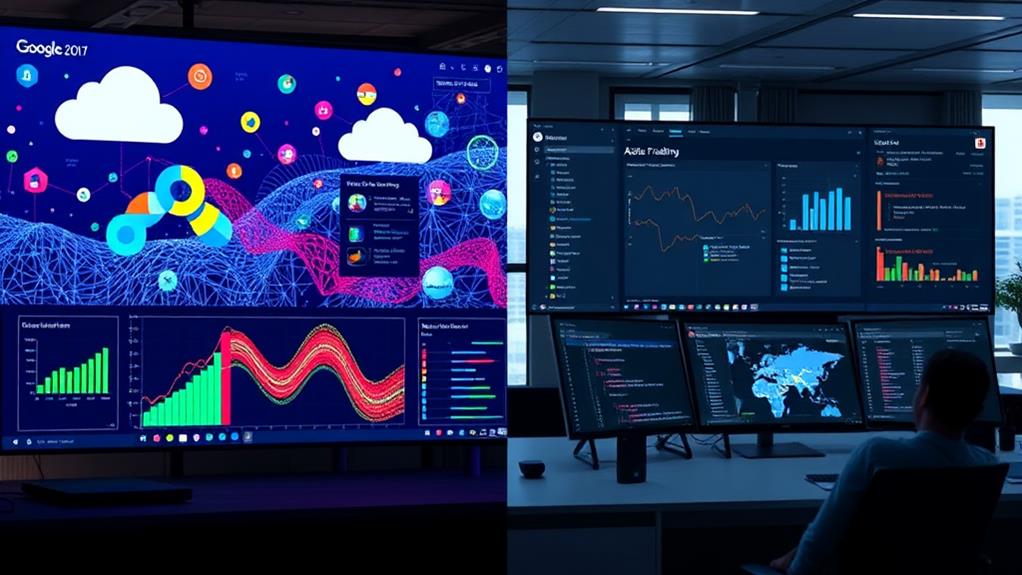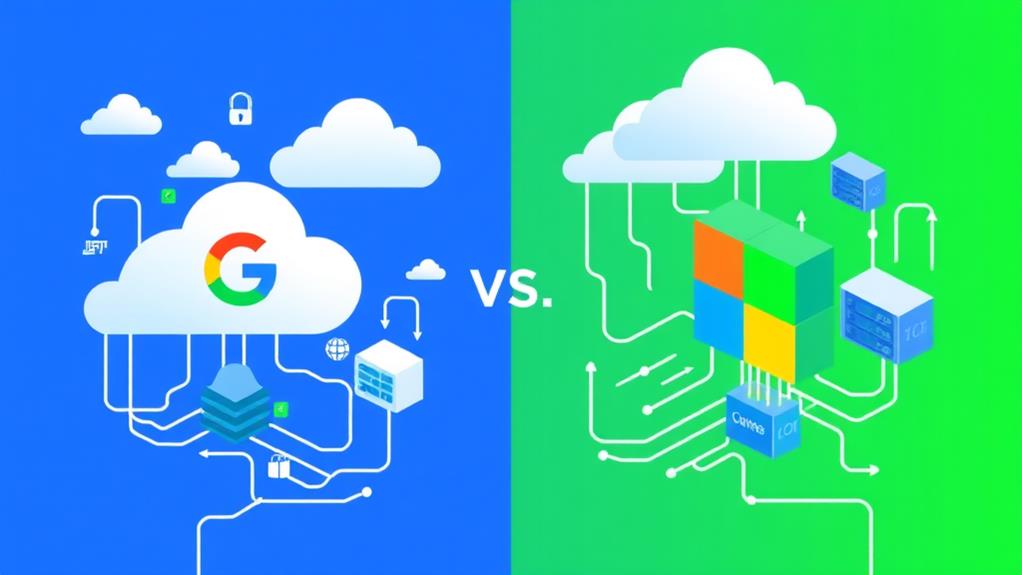When comparing Google and Microsoft in cloud services, you'll find key differences in global infrastructure, hybrid solutions, and AI capabilities. Microsoft Azure boasts over 60 regions, offering lower latency and better disaster recovery, while Google Cloud Platform has 35. Azure excels in hybrid solutions with Azure Stack and Azure Arc, seamlessly integrating resources, whereas Google's Anthos is less extensive. In AI, Google's TensorFlow and Vertex AI support custom model development, while Azure Machine Learning emphasizes automated features. Understanding these distinctions helps you choose the right platform for your needs. Keep exploring to uncover more insights about these cloud giants.
Global Infrastructure Reach
When comparing global infrastructure reach, Microsoft Azure clearly outshines Google Cloud Platform. Azure operates in over 60 cloud regions worldwide, while Google Cloud Platform has just 35. This extensive global reach means you can experience lower latency and improved performance, regardless of your location.
With Azure's multiple availability zones in each region, you're better equipped for disaster recovery and can guarantee the resilience necessary for enterprise applications. Additionally, Azure's reliability and customer support are essential features for businesses that prioritize uptime and performance, making it a preferred choice for many organizations looking for ideal reliable hosting providers.
In contrast, while Google Cloud Platform's infrastructure is robust, its fewer region pairs might limit flexibility for multinational deployments. If your organization has stringent regulatory compliance needs, Azure's larger presence is a significant advantage. It allows you to meet data residency requirements in more locations, guaranteeing you stay compliant with local regulations.
Ultimately, if you're prioritizing global infrastructure reach, Azure's extensive network of cloud regions and availability zones positions it as the more capable option. You can confidently choose Azure for your enterprise applications, knowing you'll benefit from its superior infrastructure, enhanced disaster recovery options, and global reach.
The choice is clear for organizations looking to leverage the best cloud services available.
Hybrid Cloud Solutions
Building on Azure's strong global infrastructure, hybrid cloud solutions are a key area where Microsoft Azure excels. With Azure Stack and Azure Arc, you can seamlessly run Azure services in your own data centers, allowing for effective management of resources across on-premises and cloud environments. This integration is particularly appealing if you're already using Microsoft technologies.
Additionally, Azure's emphasis on security measures for WordPress sites guarantees that your data remains protected across all platforms, providing peace of mind.
In contrast, Google Cloud Platform (GCP) provides hybrid capabilities mainly through Anthos. While Anthos supports the management of applications across various environments, including on-premises and GCP, it lacks the extensive hybrid solutions that Azure offers. GCP's focus on containerized applications and a cloud-native approach may require you to shift your existing architecture, which can be a challenge.
Moreover, Azure's global infrastructure, boasting over 60 regions, assures low latency and robust disaster recovery options, making it a superior choice for hybrid cloud deployments compared to GCP's 35 regions.
If you're looking for a reliable hybrid cloud solution that supports your organization's needs, Microsoft Azure is hard to beat.
AI and Machine Learning

AI and machine learning are transforming the way businesses operate, and choosing the right cloud platform can make a considerable difference. Google Cloud Platform (GCP) stands out with its powerful tools like TensorFlow for model development and Vertex AI for managing ML workflows. These features allow you to train and deploy models at scale effectively.
Additionally, utilizing security plugins can help safeguard your AI applications from potential threats.
On the other hand, Azure Machine Learning provides an all-encompassing suite of tools emphasizing automated machine learning and explainability, which can enhance model performance and transparency.
Here are some key aspects to reflect on when evaluating AI and machine learning offerings:
- Custom Models: GCP's AutoML enables developers with limited ML expertise to create specialized applications easily.
- Enterprise Integration: Azure's links with Microsoft products allow seamless deployment within enterprise environments, utilizing tools like Power BI.
- Compliance: Both platforms prioritize security, with GCP meeting key compliance requirements and Azure adhering to over 100 standards.
- Deployment Flexibility: Choose the platform that best aligns with your business needs for effective deployment of AI solutions.
Your decision on which cloud service to use will greatly impact your AI and machine learning initiatives.
Conclusion
In choosing between Google and Microsoft for cloud services, consider how their global infrastructure, hybrid cloud solutions, and AI capabilities align with your needs. Each platform offers unique strengths that can drive your business forward. So, which provider will empower you to innovate and scale effectively in an ever-evolving digital landscape? By evaluating these differences, you can make a more informed decision that supports your long-term goals and enhances your organization's cloud strategy.



